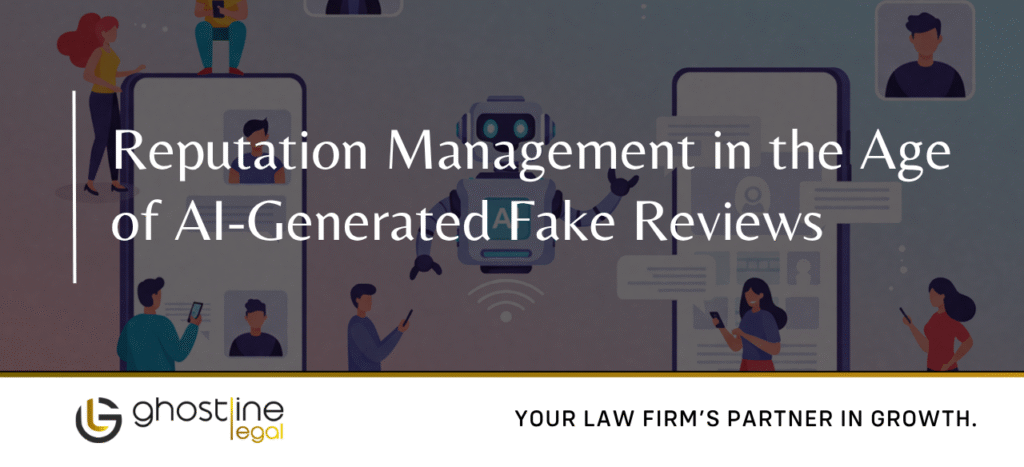This article has been authored by team Ghostline Legal.
Introduction
Fake reviews have long plagued consumer platforms like Yelp and Amazon, often fuelled by brokers who trade reviews in private online groups. Businesses sometimes incentivise positive reviews with gift cards or other perks. This problem has now extended into the legal sector.
The rise of AI-powered text generation tools such as OpenAI’s ChatGPT has made it possible for fraudsters to create fake reviews in massive volumes with alarming speed. At the same time, law firms are increasingly embracing generative AI for legitimate purposes: drafting documents, analysing case law, and quickly publishing client updates. These tools can enhance efficiency and responsiveness, helping firms stay ahead in a competitive landscape.
But speed comes with risk. AI tools lack human judgment and ethical context, making it easier for inaccurate, overly general, or even fabricated content to slip through. This creates a dual challenge for law firms: managing internal risks from AI-generated content and protecting their online reputation from AI-driven attacks.
The Growing Threat of AI-Generated Fake Reviews
Online reviews have become one of the most influential factors in how clients choose law firms. Traditional referrals or courtroom wins are no longer the sole reputation drivers; clients often rely on search engines and review platforms before making a decision.
However, malicious actors are now exploiting generative AI to produce realistic fake reviews both positive and negative at scale. These attacks may not stem from dissatisfied clients but from competitors, bots, or other bad-faith actors. AI-generated fake reviews are harder to detect than the clumsy fake reviews of the past. They are:
Well-written and less exaggerated, often mimicking genuine human sentiment.
Capable of creating entirely fictional scenarios to sound authentic.
Difficult to filter using traditional moderation algorithms.
The reputational damage can be severe. A single negative review can sway potential high-value clients. A coordinated campaign can erode years of trust and credibility, which are the bedrock of a law firm’s brand.
Why AI Content Governance Matters
Generative AI is not inherently harmful, but law firms must adopt robust content governance measures to avoid reputational risks. Internally, AI-generated memos, drafts, or research notes could be damaging if leaked or misappropriated. Externally, the firm must remain vigilant against disinformation campaigns targeting its online presence.
AI-generated content can also perpetuate biased or inaccurate information based on the data it was trained on. Without proper verification, even well-intentioned use of AI could result in errors that undermine credibility. For law firms, the stakes are higher: trust is not only a brand asset but also an ethical obligation.
How to Spot AI-Generated Fake Reviews
Detecting AI-generated fake reviews requires a trained eye and the right processes:
Watch for overly positive or overly negative language: AI tends to replicate common phrases from existing reviews, resulting in unnatural enthusiasm or hostility.
Flag excessively long reviews: Most genuine reviews are concise. A 700-word “testimonial” about a law firm is suspicious.
Check reviewer activity: Fake accounts often have little to no review history. Random usernames with number strings (e.g., Amy9437) are another red flag.
Assess consistency: Real reviewers often have a record of commenting on various businesses over time.
Firms should work with online reputation specialists or leverage advanced analytics tools capable of identifying linguistic patterns typical of AI.
Building a Resilient Brand Against AI Risks
To protect their reputation, law firms must adopt a proactive approach:
Implement review monitoring systems that flag suspicious activity early.
Educate clients about where and how to leave authentic reviews.
Engage in strategic reputation management by responding to negative reviews professionally and transparently.
Invest in robust cybersecurity and data protection, minimising the chance that internal AI-generated drafts could be leaked or manipulated.
AI-generated fake reviews represent a new frontier in digital risk. Law firms that understand these challenges and act decisively will be better positioned to maintain trust, credibility, and long-term client loyalty.
Conclusion
AI-generated fake reviews are rapdily creating threat that can undermine even the strongest law firm brands. By combining vigilant monitoring, clear content governance, and proactive client engagement, firms can protect their reputation and maintain the trust that sets them apart.
Build credibility for your law firm with strategic PR – get started now!








